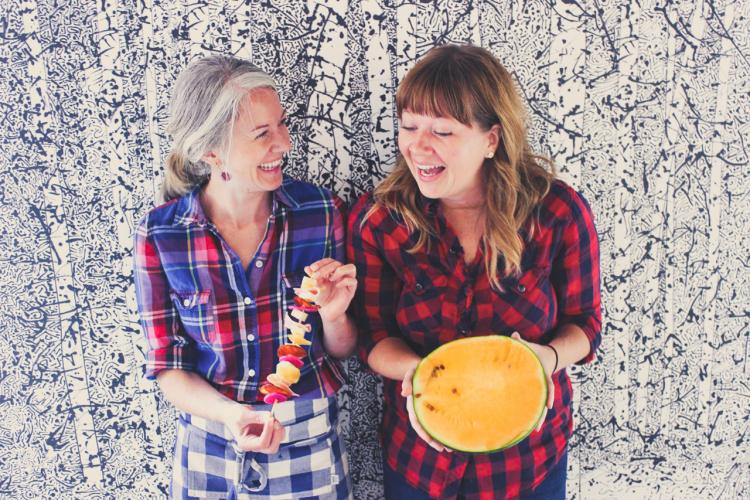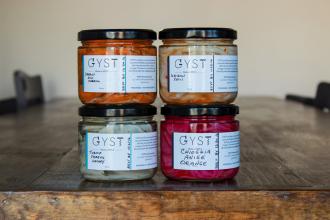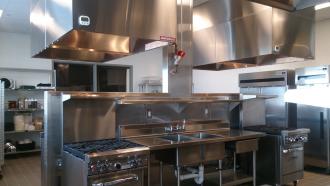This Co-op Creates a New Economy For Food Entrepreneurs and Local Farmers



In a first-of-its-kind incubator program, four women-led makers will grow their businesses and stock their wares on the co-op's shelves, cooking with produce grown nearby.
Mel and Ky Guse are sisters, but they never saw themselves going into business together. They certainly never saw themselves opening Gyst, a "fermentation bar" specializing in wine, cheese, and traditional lacto-fermented vegetables like sauerkraut and pickles in Minneapolis.
But the elements were all there: The sisters grew up in Sioux Falls, South Dakota, where their grandparents owned a bar. When Mel and Ky moved to San Francisco in 2006, they both fell into working at the Bi-Rite Market in the Mission: Mel as the assistant wine buyer and cheesemonger and Ky as a cashier. Though they’d both pursued other careers initially, something about the idea of food and community stuck. When their grandfather passed away in 2011, they headed back to the Midwest to be closer to family, and decided on Minneapolis on a whim; they moved there with the idea of opening a bar that provided all the things they’d grown to love from their time at Bi-Rite. "We thought: Maybe Minneapolis could use a wine and cheese bar that also has these traditionally fermeˇnted pickles," Ky says.
They were right: Gyst has been doing steady business since it opened in 2014. But the bar is a little off the beaten path in Minneapolis, and the sisters want to grow their venture. "But there really is no funding for small food businesses that are family-run, family-owned," Mel says.
It’s far from a straightforward business loan, but a new incubator program launched through one of Minneapolis’ oldest cooperatives, Lakewinds Food Co-op, will give the Guse sisters the leg up they need to accomplish their goal of "getting our pickles into more people’s hands," as Ky says.
The incubator program is called Maker to Market, the Guse sisters, along with three other local, women-led small ventures, make up its inaugural class, which, over the course of six months, will grow their businesses and gain access to exclusive shelf space at Lakewinds. (The fact that all the maker businesses are women-led is, according to Amy Campbell of Lakewinds, unintentional but welcome: "The food and beverage industry is still pretty heavy in the patriarchy," Campbell says.)
But Maker to Market goes a step beyond giving a boost to local small businesses. Last August, Lakewinds reached out to The Good Acre—a Twin Cities-area nonprofit food hub that supports low-income and immigrant farmers—to discuss a way to partner. Maker to Market was the result: As part of the incubator program, the makers will source exclusively from local farmers, and make use of The Good Acre’s commercial kitchen. The local farmers are able to store their produce in The Good Acre’s facilities; directly supplying the incubator initiative will, says Emily Paul, director of programs for The Good Acre, prevent a lot of their goods from going to waste.
Throughout the course of the program, Lakewinds will assist the makers with marketing and scaling their products—a process that will benefit the local small farmers, who Paul says often struggle to get their produce into more conventional retail markets.
The Twin Cities—and Minnesota as a whole—has the largest amount of food co-ops in the U.S.; there are 13 co-ops with 18 locations in the Twin Cities, and 21 co-ops with 28 locations in the state. Since the cooperative movement started in the 1970s, Campbell says, it’s been a competitive market, but for Lakewinds, "our roots have always been in buying and providing food from the closest possible source," Campbell says. Maker to Market, though, is the first partnership in the Twin Cities to fully connect the dots between the cooperative scene, the strong maker culture, and the network of small, local farmers around the cities. "This is the first full-circle, farm-to-shelf retail program in the country that we’re aware of," Campbell says.
The four makers participating in the program were selected through a blind taste test, but they all share the same mission as Lakewinds and The Good Acre: To support small farmers and enterprises that face barriers to the traditional market. At Gyst, the Guse sisters place a particular emphasis on treating their workers equitably, and sharing the stories of the farmers and producers they work with; Señoras de Salsa, another business in the Maker to Market pilot class will, once incubated, prioritize hiring immigrant women.
In the Twin Cities area, there is no shortage of maker ventures and small farmers; for Campbell, it makes perfect sense that co-ops should act as a convener of the two. Even though for Lakewinds, the Maker to Market program will be a way to differentiate the co-op from its competitors, Campbell would welcome their idea being picked up and replicated among other local and national cooperative groceries. "We’re hoping to serve as an inspiration," Campbell says.
EILLIE ANZILOTTI March 8, 2017 • photos and article Fast Company







